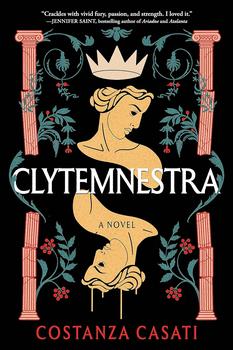Summary | Excerpt | Reading Guide | Reviews | Beyond the book | Read-Alikes | Genres & Themes | Author Bio

A Novel
by Jennifer SaintA spellbinding reimagining of the story of Elektra, one of Greek mythology's most infamous heroines, from Jennifer Saint, the author of the beloved international bestseller, Ariadne.
Three women, tangled in an ancient curse.
When Clytemnestra marries Agamemnon, she ignores the insidious whispers about his family line, the House of Atreus. But when, on the eve of the Trojan War, Agamemnon betrays Clytemnestra in the most unimaginable way, she must confront the curse that has long ravaged their family.
In Troy, Princess Cassandra has the gift of prophecy, but carries a curse of her own: no one will ever believe what she sees. When she is shown what will happen to her beloved city when Agamemnon and his army arrives, she is powerless to stop the tragedy from unfolding.
Elektra, Clytemnestra and Agamemnon's youngest daughter, wants only for her beloved father to return home from war. But can she escape her family's bloody history, or is her destiny bound by violence, too?
For the Greek myth and tragedy novice, the ancient stories often present a Gordian knot of deep backstory — who did what to whom and when — requiring skillful fingers to unravel the gnarled threads. Saint is a master at this. She explores the cosmic themes of betrayal and retribution from the female eye with musical prose that cuts with sharp emotional insights. Elektra is a near non-stop reading experience with expert pacing and riveting first-person narratives from the three protagonists...continued
Full Review
 (1002 words)
(1002 words)
(Reviewed by Peggy Kurkowski).
 We have all heard of the Oedipus complex, right? Its origin is in Greek mythology, where Oedipus, King of Thebes, unknowingly kills his own father and marries his mother. Sigmund Freud introduced the concept of the complex, which posits that a young boy has a subconscious sexual desire toward his mother and anger or jealousy toward his father. Less well-known is the Electra complex, which is essentially the female version of the Oedipus complex, wherein a girl between the ages of three and six is subconsciously sexually attached to her father and increasingly hostile toward her mother. Often mistakenly attributed to Freud, it was his contemporary, Carl Jung, who devised the theory in 1913, drawing from his colleague's hypotheses on the ...
We have all heard of the Oedipus complex, right? Its origin is in Greek mythology, where Oedipus, King of Thebes, unknowingly kills his own father and marries his mother. Sigmund Freud introduced the concept of the complex, which posits that a young boy has a subconscious sexual desire toward his mother and anger or jealousy toward his father. Less well-known is the Electra complex, which is essentially the female version of the Oedipus complex, wherein a girl between the ages of three and six is subconsciously sexually attached to her father and increasingly hostile toward her mother. Often mistakenly attributed to Freud, it was his contemporary, Carl Jung, who devised the theory in 1913, drawing from his colleague's hypotheses on the ...

If you liked Elektra, try these:

by Caro De Robertis
Published 2025
Perfect for fans of Circe and Black Sun, this bold and subversive feminist retelling of the Greek myth of Psyche and Eros explores the power of queer joy and freedom.

by Costanza Casati
Published 2024
Madeline Miller's Circe meets Cersei Lannister in a stunning debut following Clytemnestra, the most notorious heroine of the ancient world and the events that forged her into the legendary queen.